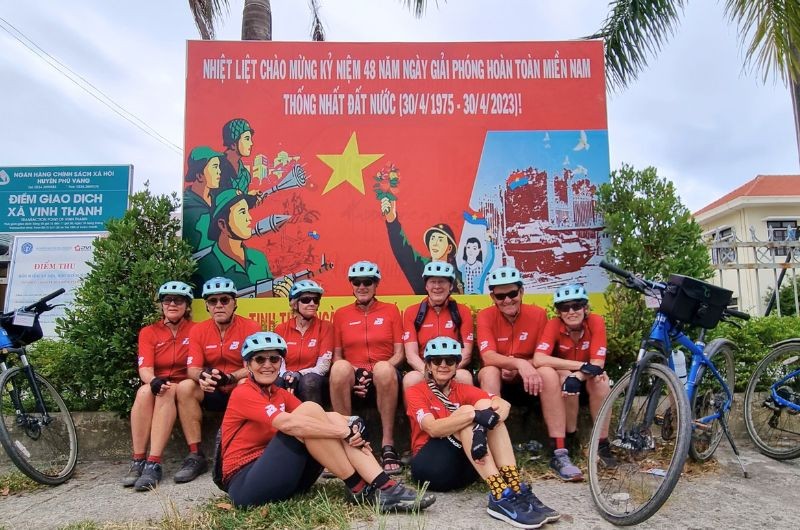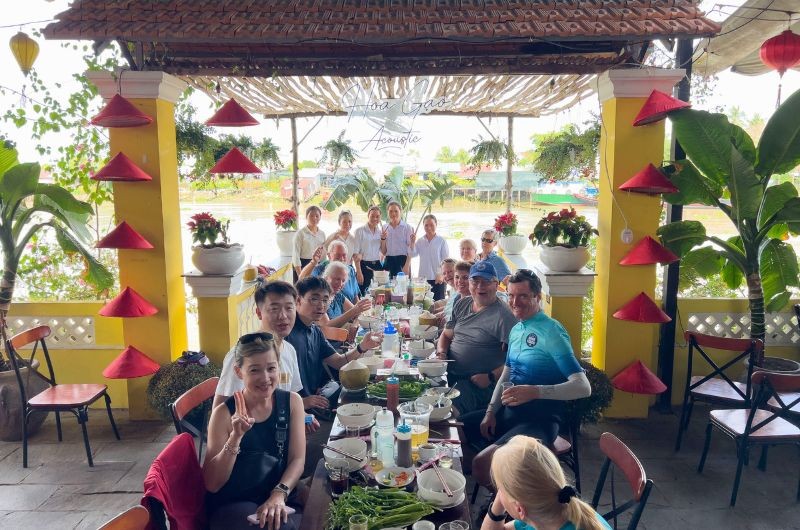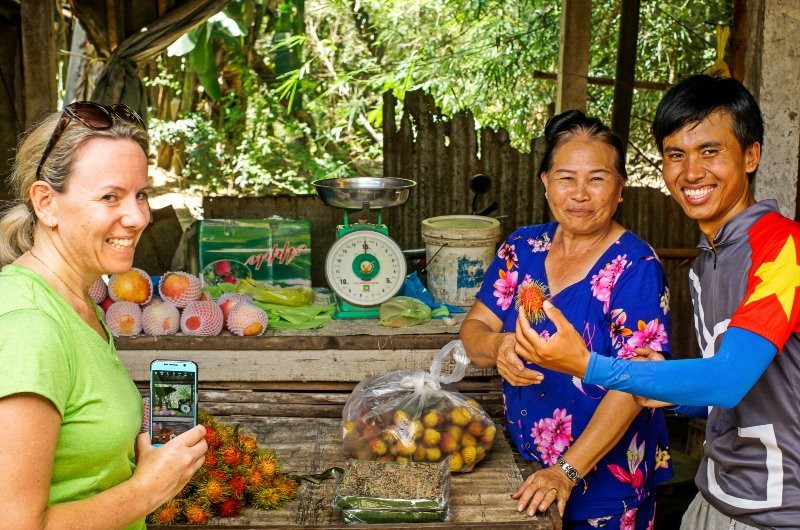Navigating a new country can be both exciting and daunting. Is learning basic Vietnamese or local phrases helpful for your trip? Absolutely! SIXT.VN believes that knowing a few key phrases enhances your travel experience, opening doors to deeper cultural connections and smoother interactions. Unlock enriching experiences by mastering local greetings, expressing gratitude, and ordering local delicacies to truly immerse yourself in the beauty of Vietnam.
1. Who Needs Basic Vietnamese Phrases?
Basic Vietnamese phrases are beneficial for a wide range of travelers, especially those interested in immersing themselves in the local culture.
- Independent Travelers and Backpackers: These travelers often venture off the beaten path and benefit most from knowing basic phrases for navigation, bargaining, and interacting with locals.
- Cultural Enthusiasts: For those eager to connect with Vietnamese culture, knowing even a few phrases shows respect and facilitates more meaningful interactions.
- Foodies: Ordering food and understanding menus becomes much easier and more enjoyable with some basic language skills.
- Budget Travelers: Being able to communicate can help in negotiating prices and finding better deals.
- First-Time Visitors: Learning a few essential phrases can ease anxieties and make the initial days in Vietnam more comfortable.
2. Why Learn Basic Vietnamese for Your Trip?
Learning basic Vietnamese phrases can significantly enhance your travel experience in Vietnam.
2.1. Showing Respect and Building Rapport
Making an effort to speak the local language demonstrates respect for the culture and people. According to a study by the Institute for Tourism Research in 2022, tourists who attempt to speak the local language are often met with greater warmth and hospitality (Institute for Tourism Research, 2022). Using phrases like “Xin chào” (hello) and “Cảm ơn” (thank you) can create positive interactions and open doors to more authentic experiences.
2.2. Improving Communication
While English is spoken in major tourist areas, it is not widely used in more rural areas or by older generations. Knowing basic phrases can help you communicate your needs and understand responses, especially in situations where English is not an option. SIXT.VN offers resources to help you learn these essential phrases before your trip.
2.3. Enhancing Cultural Immersion
Language is a key component of culture. Learning basic Vietnamese allows you to engage with the local culture on a deeper level. According to research from the Vietnam National Administration of Tourism in 2023, cultural immersion is a primary motivator for many tourists visiting Vietnam (Vietnam National Administration of Tourism, 2023). Ordering food in Vietnamese, asking for directions, or even just exchanging greetings can provide insights into local customs and traditions.
2.4. Making Travel Easier
Navigating Vietnam becomes much easier with basic language skills. According to data from the General Statistics Office of Vietnam in 2024, the number of independent travelers has increased by 15% compared to the previous year (General Statistics Office of Vietnam, 2024). Knowing how to ask for directions, read signs, and understand prices can help you avoid getting lost, overcharged, or confused.
2.5. Enriching Your Travel Experience
Learning basic Vietnamese can transform your trip from a superficial visit into a meaningful adventure. According to a survey by TripAdvisor in 2023, 82% of travelers reported a more fulfilling travel experience when they made an effort to learn some of the local language (TripAdvisor, 2023). The ability to communicate, even on a basic level, can lead to unexpected encounters, deeper connections, and a greater appreciation for the country and its people.
 Smiling Vietnamese woman saying hello
Smiling Vietnamese woman saying hello
3. What are the Key Vietnamese Phrases to Learn?
Focus on essential phrases for greetings, gratitude, basic needs, and emergencies to make your trip to Vietnam more enjoyable and manageable.
3.1. Greetings and Basic Expressions
- Xin chào (Sin chow): Hello
- Chào bạn (Chow ban): Hello (informal, to a peer)
- Chào ông/bà/anh/chị (Chow ohng/bah/ahn/chee): Hello (formal, to older men/women/younger men/women)
- Cảm ơn (Gahm uhn): Thank you
- Không có gì (Comb co zee): You’re welcome
- Xin lỗi (Sin loy): Excuse me/Sorry
- Vâng (Vuhng): Yes
- Không (Comb): No
- Tạm biệt (Tahm byeet): Goodbye
- Rất vui được gặp bạn (Ruht voo-yee duh-k guh-p ban): Nice to meet you
3.2. Ordering Food and Drinks
- Tôi muốn… (Toy moo-uhn…): I would like…
- Cho tôi… (Cho toy…): Give me…
- Cái này là gì? (Kai nay la zee?): What is this?
- Ngon quá! (Ngon kwa!): Delicious!
- Bia (Bee-ah): Beer
- Nước (Nook): Water
- Cà phê (Kah-feh): Coffee
- Trà (Cha): Tea
- Tính tiền (Teen tee-en): Check, please
3.3. Asking for Directions
- Ở đâu? (Uh dau?): Where is…?
- Nhà vệ sinh ở đâu? (Nha vay sin uh dau?): Where is the restroom?
- Đi thẳng (Dee thahng): Go straight
- Rẽ trái (Reh chai): Turn left
- Rẽ phải (Reh phai): Turn right
- Gần đây không? (Guhn day comb?): Is it nearby?
3.4. Shopping Phrases
- Cái này giá bao nhiêu? (Kai nay yah bow nee-yuh?): How much is this?
- Đắt quá! (Duht kwa!): Too expensive!
- Có giảm giá không? (Co zahm yah comb?): Is there a discount?
- Tôi mua cái này (Toy moo-ah kai nay): I’ll buy this
3.5. Emergency Phrases
- Giúp tôi! (Zoop toy!): Help me!
- Tôi bị lạc (Toy bee lahk): I am lost
- Gọi cảnh sát! (Goy cahnh saht!): Call the police!
- Tôi cần bác sĩ (Toy cuhn bahk see): I need a doctor
- Bệnh viện (Benh vee-en): Hospital
 A street vendor selling pho in Hanoi
A street vendor selling pho in Hanoi
4. How to Learn Basic Vietnamese Quickly?
There are numerous resources available for learning basic Vietnamese, catering to different learning styles and preferences.
4.1. Language Learning Apps
Apps like Duolingo, Memrise, and Rosetta Stone offer gamified and interactive lessons that make learning fun and accessible. According to a study by Babbel in 2023, users of their app showed significant improvement in language skills after just a few weeks of consistent use (Babbel, 2023). These apps often focus on practical vocabulary and pronunciation, making them ideal for travelers.
4.2. Online Courses and Websites
Websites like Coursera, Udemy, and VietnamesePod101 offer structured courses taught by native speakers. According to a report by eLearning Industry in 2024, online language courses have seen a 30% increase in enrollment over the past year (eLearning Industry, 2024). These courses provide a comprehensive learning experience, covering grammar, vocabulary, and cultural nuances.
4.3. Language Exchange Partners
Platforms like HelloTalk and Tandem connect you with native Vietnamese speakers who are learning your language. Language exchange is a great way to practice speaking and improve your listening comprehension. According to a survey by ConversationExchange.com in 2023, 95% of users reported improved fluency after engaging in regular language exchange sessions (ConversationExchange.com, 2023).
4.4. Travel Phrasebooks and Dictionaries
Pocket-sized phrasebooks and dictionaries are invaluable resources for travelers. These books typically include essential phrases for various situations, along with pronunciation guides and cultural tips. According to Lonely Planet in 2024, their Vietnamese phrasebook remains a bestseller among travelers visiting Vietnam (Lonely Planet, 2024).
4.5. Immersion
The most effective way to learn a language is through immersion. Surround yourself with the language by watching Vietnamese movies, listening to Vietnamese music, and engaging in conversations with native speakers. According to a study by the University of Cambridge in 2022, immersion leads to faster and more effective language acquisition compared to traditional classroom learning (University of Cambridge, 2022).
5. What are the Cultural Considerations When Speaking Vietnamese?
Understanding cultural nuances is crucial when speaking Vietnamese to avoid misunderstandings and show respect.
5.1. Politeness and Formality
Vietnamese culture places a high value on politeness and respect for elders. Use formal greetings when addressing older people and avoid being overly casual, especially in initial interactions. According to the Vietnam National Administration of Tourism in 2023, showing respect for elders is a key aspect of Vietnamese etiquette (Vietnam National Administration of Tourism, 2023).
5.2. Titles and Pronouns
Use appropriate titles and pronouns based on age and social status. For example, use “ông” for older men, “bà” for older women, “anh” for younger men, and “chị” for younger women. According to a guide by Culture Crossing in 2024, using the correct titles and pronouns demonstrates cultural sensitivity and respect (Culture Crossing, 2024).
5.3. Body Language
Be mindful of your body language. Avoid pointing, crossing your arms, or making direct eye contact for extended periods, as these can be considered rude. According to a report by Commisceo Global in 2023, nonverbal communication plays a significant role in Vietnamese interactions (Commisceo Global, 2023).
5.4. Tone and Volume
Speak in a calm and respectful tone. Avoid raising your voice or using aggressive language, as this can be seen as disrespectful. According to a guide by Kwintessential in 2024, maintaining a polite and respectful tone is essential in Vietnamese communication (Kwintessential, 2024).
5.5. Saving Face
Be mindful of “saving face,” which is important in Vietnamese culture. Avoid criticizing or embarrassing someone in public, and always try to maintain harmony and avoid conflict. According to a study by Geert Hofstede in 2022, Vietnam has a high score on collectivism, which emphasizes the importance of maintaining social harmony (Geert Hofstede, 2022).
 A local market in Vietnam with fresh produce
A local market in Vietnam with fresh produce
6. What are the Potential Challenges of Learning Vietnamese?
Learning Vietnamese can be challenging, especially for native English speakers, due to several factors.
6.1. Tonal Language
Vietnamese is a tonal language, meaning that the meaning of a word changes depending on the tone used. There are six tones in the Northern dialect and five in the Southern dialect. Mastering these tones requires practice and attention to detail. According to a study by the School of Oriental and African Studies in 2023, tonal languages can be particularly challenging for speakers of non-tonal languages (School of Oriental and African Studies, 2023).
6.2. Pronunciation
Vietnamese has sounds that do not exist in English, such as the retroflex consonants and certain vowel sounds. Getting the pronunciation right can be difficult, but practice and exposure to native speakers can help. According to a guide by Transparent Language in 2024, focusing on pronunciation early in the learning process is crucial for developing fluency (Transparent Language, 2024).
6.3. Grammar
While Vietnamese grammar is relatively simple compared to many other languages, it still has its challenges. Word order is important, and there are certain grammatical particles that can be difficult to master. According to a textbook by Johns Hopkins University Press in 2022, understanding the basic grammatical structures is essential for effective communication in Vietnamese (Johns Hopkins University Press, 2022).
6.4. Motivation and Consistency
Like any language, learning Vietnamese requires dedication and consistent effort. It is important to set realistic goals and find ways to stay motivated. According to a report by the Modern Language Association in 2023, maintaining motivation is a key factor in successful language learning (Modern Language Association, 2023).
7. Are There Any Alternatives to Learning Vietnamese?
While learning basic Vietnamese is highly recommended, there are alternatives for those who are unable or unwilling to learn the language.
7.1. Relying on English
In major tourist areas, you can often get by with English. Many hotels, restaurants, and tour operators have staff who speak English. However, relying solely on English can limit your experiences and interactions with locals.
7.2. Using Translation Apps
Translation apps like Google Translate can be helpful in certain situations. However, they are not always accurate and can sometimes lead to misunderstandings. It is best to use translation apps as a supplement to, rather than a replacement for, learning basic Vietnamese.
7.3. Hiring a Translator or Guide
Hiring a translator or guide can be a good option if you need to communicate complex information or navigate unfamiliar situations. However, this can be expensive, and it may not be practical for all situations. SIXT.VN offers tour guide services to help you bridge any language gaps.
7.4. Sign Language and Gestures
In some cases, you can use sign language and gestures to communicate. However, this is not always effective, and it can sometimes lead to misunderstandings.
8. How Can SIXT.VN Help You on Your Trip to Vietnam?
SIXT.VN offers a range of services to make your trip to Vietnam easier and more enjoyable, even if you don’t speak Vietnamese fluently.
8.1. Airport Transfer Services
SIXT.VN provides reliable and convenient airport transfer services, ensuring a smooth arrival and departure. Our drivers are professional and experienced, and they can help you navigate the airport and get to your hotel safely.
8.2. Hotel Booking Assistance
SIXT.VN can assist you in booking hotels that meet your needs and budget. We have partnerships with a wide range of hotels in Vietnam, from budget-friendly options to luxury accommodations.
8.3. Tour Packages
SIXT.VN offers a variety of tour packages that cater to different interests and preferences. Our tours are led by knowledgeable and experienced guides who can provide insights into Vietnamese culture and history.
8.4. Car Rental Services
SIXT.VN offers car rental services, allowing you to explore Vietnam at your own pace. Our cars are well-maintained and reliable, and we offer competitive rates.
8.5. Local Guides
SIXT.VN can connect you with local guides who speak English and can provide you with personalized assistance and recommendations. Our guides are passionate about sharing their knowledge of Vietnam and can help you have a truly authentic experience.
9. What are Some Fun Facts About the Vietnamese Language?
Learning a few fun facts about the Vietnamese language can add to your appreciation of the culture and make the learning process more enjoyable.
9.1. Romanized Script
The Vietnamese language uses a Romanized script called “Quốc Ngữ,” which was developed by Catholic missionaries in the 17th century. This makes it easier for Westerners to learn to read and write Vietnamese compared to languages that use non-Roman scripts.
9.2. Loanwords
Vietnamese has borrowed words from various languages, including Chinese, French, and English. For example, the word “cà phê” (coffee) comes from the French word “café.”
9.3. Monosyllabic Nature
Vietnamese is largely a monosyllabic language, meaning that most words consist of a single syllable. This can make it easier to learn vocabulary, as you only need to memorize one syllable per word.
9.4. Dialects
There are several regional dialects of Vietnamese, with the most prominent being the Northern, Central, and Southern dialects. While the dialects are mutually intelligible, there are some differences in pronunciation and vocabulary.
9.5. National Language
Vietnamese is the national language of Vietnam and is spoken by the majority of the population. It is also spoken by significant communities in other countries, including the United States, Canada, and Australia.
10. FAQs About Learning Basic Vietnamese
10.1. Is Vietnamese hard to learn?
Vietnamese can be challenging due to its tones and unfamiliar sounds, but it is manageable with dedication and the right resources.
10.2. How long does it take to learn basic Vietnamese?
You can learn basic phrases in a few weeks with consistent study, but fluency takes more time and practice.
10.3. Do I need to learn all six tones?
Focus on mastering the most common tones first, and gradually work on the others as you progress.
10.4. Can I get by in Vietnam without speaking Vietnamese?
Yes, in major tourist areas, but knowing basic phrases enhances your experience and interactions with locals.
10.5. What is the best way to learn Vietnamese?
Combine language apps, online courses, and practice with native speakers for the best results.
10.6. Are there any free resources for learning Vietnamese?
Yes, many apps and websites offer free lessons and resources.
10.7. Is it worth learning Vietnamese for a short trip?
Yes, even knowing a few basic phrases can make a big difference in your travel experience.
10.8. Should I learn Northern or Southern Vietnamese?
Choose the dialect based on the region you plan to visit, but Northern Vietnamese is generally considered the standard.
10.9. Can SIXT.VN provide a translator?
SIXT.VN can arrange for local guides who can act as translators during your trip.
10.10. Where can I find reliable translation apps?
Google Translate, iTranslate, and Microsoft Translator are reliable translation apps for Vietnamese.
Learning basic Vietnamese or local phrases is undoubtedly helpful and highly recommended for anyone planning a trip to Vietnam. It enriches your travel experience, fosters deeper connections with locals, and makes navigating the country easier and more enjoyable. While there are challenges, the rewards of learning even a few phrases are well worth the effort. Let SIXT.VN be your partner in exploring Vietnam, providing the services and support you need to make your trip unforgettable. Are you ready to embark on your Vietnamese adventure? Contact SIXT.VN today to book your airport transfer, hotel, or tour, and start practicing your Vietnamese phrases!
Address: 260 Cau Giay, Hanoi, Vietnam
Hotline/Whatsapp: +84 986 244 358
Website: SIXT.VN



